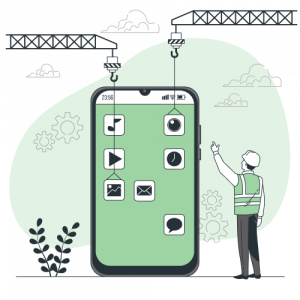
Conquering the Mobile Frontier

In the early days of the 21st century, we witnessed a paradigm shift in how we interact with technology. Mobile phones, once bulky devices for calls and essential messages, were morphing into powerful pocket computers. This birth of the smartphone era presented startups with a golden opportunity—the chance to leverage mobile apps and reach a wider audience than ever before. However, getting started in the field of mobile app development can be challenging. Here, we delve into 10 crucial tips to equip your startup’s mobile app for success:
1. Know Your Why: Unearth the Problem Your App Solves

Before diving headfirst into development, take a step back. What problem are you trying to solve with your app? Identify a specific need in your target market and tailor your app to address it effectively. Conduct thorough market research to understand existing solutions and identify any gaps. Recall that a profitable app distinguishes itself from the competition with a unique value proposition.
2. User First: Design with Empathy

Your users are the lifeblood of your app. Prioritize user experience (UX) by designing an app that is intuitive, user-friendly, and caters to their specific needs. Focus on clean interfaces, straightforward navigation, and a seamless user journey. Throughout the development process, run user tests to get input and make iterations to your design.
3. Keep it Lean: Prioritize Core Features for Launch

It’s tempting to pack your app with every feature imaginable. However, for startups, it’s wiser to prioritize core functionalities that deliver the core value proposition. This keeps development costs in check and ensures a faster launch. You can always add new features based on user feedback and market response.
4. Native or Cross-Platform? Choose Your Development Path

There are two main approaches to mobile app development: native and cross-platform technologies such as Flutter, React Native. Native apps are built specifically for either Android or iOS, offering optimal performance and a platform-specific user experience. Cross-platform apps use a single codebase to work on both platforms, saving development time and resources. When making this decision, consider your budget, target audience, and desired feature set.
5. Assemble Your Team: Find the Right Development Partner

Developing a successful app often requires a skilled team of developers, designers, and project managers. If you need in-house expertise, consider partnering with a reputable mobile app development company. Look for a team with experience in your industry and a proven track record of building user-centric apps.
6. Embrace Iteration: Build, Test, Learn, and Repeat

Mobile app development is an iterative process. Don’t expect to launch a perfect product on day one. Instead, build a minimum viable product (MVP) with core functionalities and gather user feedback. Use these tips to improve the user experience, add new features, and expand your app’s functionality.
7. Optimize for Visibility: App Store Optimization (ASO) is Key

Even the most fantastic app will only gain traction if people can find it. Here’s where App Store Optimization (ASO) comes in. Optimize your app’s title, description, and keywords to rank higher in app store searches. Utilize relevant screenshots and app previews to showcase your app’s value proposition.
8. Market Like a Master: Craft a Winning App Launch Strategy

A clear marketing plan is necessary for a successful app launch. Generate pre-launch buzz by creating social media campaigns, influencer partnerships, and press releases. Utilize targeted advertising to reach your ideal users and build excitement around your app’s release.
9. Cultivate Loyalty: Keep Users Engaged
c
The battle continues after the launch. Retaining users is crucial for long-term success. Implement strategies to keep your users engaged, such as push notifications, loyalty programs, exclusive content, and gamification elements. Update your app frequently with new features, security patches, and bug fixes to demonstrate to users your dedication to their continued progress.
10. Embrace Analytics: Data-Driven Decisions for Growth

Utilize app analytics solutions to monitor essential metrics like user acquisition, engagement, and conversion rates. Examine this information to comprehend user behavior and pinpoint areas that want improvement. Leverage these insights to refine your app’s features, marketing campaigns, and overall strategy for sustainable growth.
Conclusion

At Sigosoft, we understand the challenges and opportunities startups face in the mobile app world. That’s why we don’t just offer these tips—we’re here to be your partner in the entire app development journey. From brainstorming your initial concept to crafting a user-centric design and navigating the app store launch, our team of professionals will realize your vision. Let’s discuss your app idea and turn it into a reality—contact us today for a free consultation!
Bonus Tip: Embrace the Future: Consider Emerging Technologies
Investigate cutting-edge technologies like virtual reality (VR) and augmented reality (AR), which can provide your app with new features and user experiences. Building a successful mobile app for your startup requires a combination of strategic planning, user-centric design, and continuous optimization. You may turn your app idea into a successful mobile solution that wins over your target audience’s hearts by using these pointers and remaining flexible.
